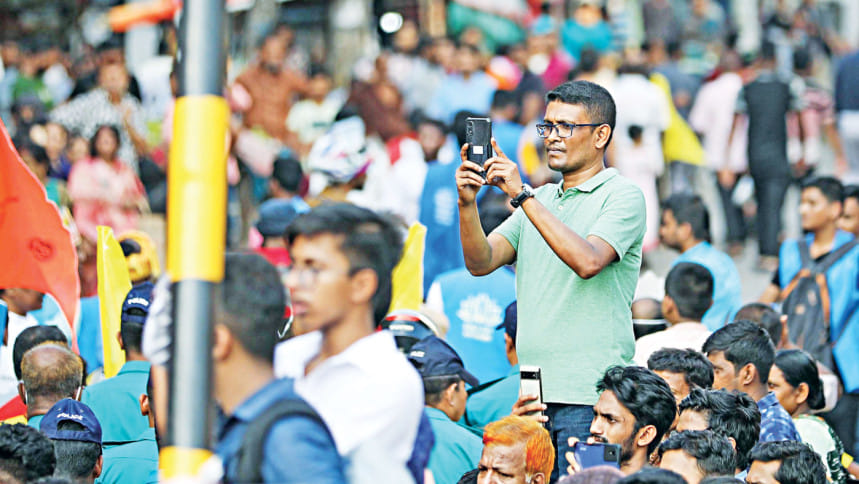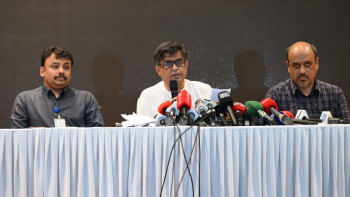Telecom reforms revolve around efficiency, price cuts

Over the past year, the interim government has pushed reforms in the telecom sector to improve service, remove unnecessary layers, and lower costs for consumers.
Some initiatives are already in place, while others remain on paper. Authorities say full implementation could bring the sector in line with international standards.
At the centre of the overhaul is the draft "Telecom Network and Licensing Reform Policy 2025", prepared by the Ministry of Posts and Telecommunications and the Bangladesh Telecommunication Regulatory Commission (BTRC). The draft is yet to be finalised.
It proposes a simplified licensing system, limits on foreign ownership, and the removal of costly intermediary layers that inflate prices.
Currently, the sector operates a confusing network of six or seven licensing layers. The draft reduces this to three: international, national, and service.
Foreign ownership would be capped at 49 percent for the international layer and 55-60 percent for the national layer. Internet service providers (ISPs) would benefit from a "light-touch" regime with less paperwork.
The biggest change is the planned removal of middle-layer companies, including Interconnection Exchanges (ICXs), International Gateways (IGWs), and International Internet Gateways (IIGs).
Introduced in 2008 to stop illegal internet calls (known as VoIP), these companies often acted as middlemen, charging fees without adding value.
Mobile operators were banned from connecting calls from each other directly, forcing them through ICXs.
A cartel was formed by some of these companies in 2014, called the IGW Operators Forum, controlling call termination and funnelling Tk 631 crore to a Beximco-linked account. The BTRC cancelled their authority earlier this year.
IIGs, originally to manage international internet traffic, are now redundant as ISPs and mobile operators can handle bandwidth directly.
"Despite minimal infrastructure investment, often with just a few crores of taka, licensees extracted hundreds of crores through strategic positioning and regulatory shielding," said Faiz Ahmad Taiyeb, special assistant to the chief adviser for posts and telecom.
With many ICX and IGW licences expiring in 2027, the BTRC says it will not renew them. Removing these layers should lower prices and improve efficiency without harming security or monitoring.
Telecom operators have cautiously welcomed the changes.
"Overall, the policy is a good start, and we welcome it," said Shahed Alam, chief corporate and regulatory affairs officer at Robi Axiata.
"However, we have raised some concerns, like curbing foreign shareholding, and introducing irrelevant parameters such as rollout obligations, spectrum configuration, and fibre rollout obligations," he added.
FIBRE FOR ALL
Another major reform targets the country's internet "motorways". Until now, Fibre@Home and Summit Communications dominated the national network.
Mobile companies were barred from installing their own equipment on these cables, making them reliant on these providers.
That restriction has been lifted, allowing mobile operators to install data transmission equipment on leased fibre networks.
The government also aims to create a national "fibre optic bank", using unused cables from state-owned utilities such as the power grid and railways.
About 40 percent of the country's 78,400km of fibre is unused. Sharing it could reduce internet costs, speed up 5G rollout, and bring fast connections to rural areas.
POWER AND INDEPENDENCE
The government is revising the Bangladesh Telecommunication Act, 2001, which strengthened ministerial control in 2010.
The new plan gives the BTRC more autonomy in operational matters such as approving new products or staff promotions, while major decisions, including licence renewals, spectrum allocation, and changes involving state-owned companies, remain under ministerial oversight.
"The intent is to create a checks and balances model," Taiyeb said, adding that it ensures strategic alignment across ministries.
Experts caution that true independence is limited.
Barrister Fatema Anwar, a lawyer at the Supreme Court, said, "By allowing more freedom only in operational matters while retaining control over major decisions, particularly those involving six state-owned telecom entities, the risk of conflict of interest and political interference persists."
BTRC Chairman Major Gen (retired) Md Emdad ul Bari said neutrality is a must. "If we continue to treat state-owned and private operators under different standards, we undermine the very rationale for having an independent regulator."
However, Taiyeb argues that public operators are needed to guarantee coverage in unprofitable areas. "We must protect public interest through these institutions."
RIGHTS AND BANDWIDTH
The ministry has ordered the removal of laws that allow internet shutdowns, and called for phone and internet surveillance to have more oversight, bringing practices closer to international standards.
It also proposed reforms to the National Telecommunication Monitoring Centre (NTMC) to improve accountability, transparency, and judicial supervision.
Support from Chief Adviser Muhammad Yunus helped bring Starlink, Elon Musk's satellite internet service, to Bangladesh.
State-owned Bangladesh Submarine Cables PLC (BSCPLC) now handles 4 terabits per second of international bandwidth, more than double last year's capacity. The upcoming SEA-ME-WE 6 cable will add 17 terabits per second.
LONG-TERM VISION NEEDED
A review panel, led by Planning Adviser Wahiduddin Mahmud, is currently assessing the draft Telecom Network and Licensing Reform Policy amid protests from local firms wary of foreign dominance.
Telecom analyst Abu Nazam M Tanveer Hossain said reforms must follow a clear sequence. First, the National Telecom Policy should be updated with a 10-20 year vision.
Subsequently, there should be amendments to laws and rules, said Hossain. "Only afterwards, there could be adjustments to rules and licences."
"Any deviation from this structure leads to inconsistency, reduces investor confidence, and compromises consumer protection," he said.

 For all latest news, follow The Daily Star's Google News channel.
For all latest news, follow The Daily Star's Google News channel. 



Comments